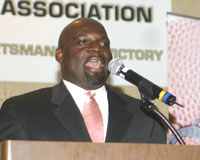NCAA News Archive - 2006
« back to 2006 | Back to NCAA News Archive Index
|
The NCAA News
Black Coaches Association Executive Director Floyd Keith knew at the age of 12 that coaching was in his future. An injury cut short his playing days, but it opened the door to what evolved into a 30-year coaching career.
Now, the NCAA is launching an innovative “
The academy, which will debut in January 2007 in conjunction with the American Football Coaches Association’s annual convention in
The academy seeks to not only increase the number of football student-athletes who enter the sport’s coaching ranks — and specifically the number of student-athletes of color — but also to spark their interest by having them interact with the hundreds of current and the many recently retired coaches who attend the AFCA convention.
Thirty participants will be chosen for the academy. Candidates may be graduating seniors or recent graduates within two or three years of having completed their eligibility. Applicants also must indicate an interest in pursuing a college football coaching career and be recommended by a head coach at an NCAA member institution.
A panel of former college head coaches will choose 15 to 20 participants by October 1. The remaining slots will be filled by December 1 to accommodate student-athletes who exhaust their eligibility with the 2006 season. Registration is free, and transportation, lodging, meals and program materials will be provided for each participant.
Coaches mentoring coaches
According to Charlotte Westerhaus, NCAA vice president for diversity and inclusion, the idea for the academy sprung from multiple sources, including coaches associations and other college sports-related organizations. Westerhaus also recognized research citing the need to boost diversity among head football coaches. While the
“Diversity and inclusion means just that — diversity and inclusion. I would expect, though, based on the dire need for more black, Hispanic, Latino and Asian coaches, that most of the applicants will be of color because there is a need to increase those numbers. At the same time, overall, we have a need to develop coaches who understand and practice diversity and inclusion,” said Westerhaus, adding that input from football coaches will drive the curriculum.
“Successful coaches know what it takes to be an effective coach,” she said.
Although specific presenters have yet to be finalized, organizers plan to target coaches of high character who have been successful in winning on the field, graduating players and hiring diverse staffs. They also need the technical expertise to fully cover topics ranging from career opportunities and lifestyle to diversity, management and fiscal responsibility and compliance considerations.
Perhaps even more valuable than the actual one-to-two-day academy will be the after-effects of the program’s mentoring component. The intent is to match each participant with an already-established coach who can encourage and guide interest, especially once the academy and the convention have concluded.
‘Golden opportunity’
Promotion of the evolving campaign has been limited, but word of its existence is expected to spread quickly. Grant Teaff, longtime executive director of the AFCA, described the academy as one of the most exciting things with which the coaching association has been involved.
“Football coaches are our business. We are the organization that provides educational opportunities, networking and interaction among coaches. Our mission is to protect and promote the game. This is a perfect match for us,” said Teaff. “There’s a deep commitment from the AFCA, NCAA and BCA to afford more opportunities to young minorities and non-minorities alike to come into this wonderful game, begin to grow and reach their goals. To me, it’s the most golden of opportunities that any young person could have if he has an inkling that he wants to go into coaching.”
The BCA’s Keith compared the newest member of the NCAA’s series of football coaching academies to the Nike “So You Want to be a Coach” workshop. Put on by the Women’s Basketball Coaches Association, the workshop designed to encourage ethnic minority females to become women’s basketball coaches has drawn about 50 participants annually in each of the last three years. The American Volleyball Coaches Association also administers a similar program.
Like the Nike program, Keith believes the football outreach will be well received and provide great value because it is aimed at a population not frequently exposed to the positive aspects of coaching.
“A lot of our athletes have an interest in coaching, but it is never reinforced to the magnitude that this program will reinforce it. Anytime we can fuel the interests of potential coaches, particularly in a sport that needs them in the worst way, I think we’re doing good work,” Keith said.
Teaff noted that many coaches entering the profession now have dreams of leading an NCAA Division I-A program, but that possibility is slim with just 119 teams competing at the level. But he believes that through the
As the first edition of the
“Our coaches try to get the best and brightest for their football teams. The good teams are diverse racially, ethnically, internationally. Our coaches are living and breathing diversity on the football field and we know its happening in the classroom,” she said. “Now we need for it to happen successfully in the hiring of coaches. That’s the goal.”
Application materials will be available in mid-June. For more information, contact Dennis Poppe, NCAA director of baseball and football, or Corey Jackson, interim director for diversity and inclusion.
© 2010 The National Collegiate Athletic Association
Terms and Conditions | Privacy Policy

